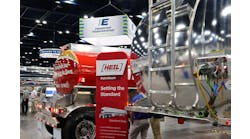The National Truck Equipment Association and the Specialty Equipment Market Association are suing the California Air Resources Board to stop implementation of the Advanced Clean Fleets regulation.
Sidley Austin LLP filed the suit on October 8 on behalf of the organizations. SEMA and NTEA, the work truck industry trade group, contend that CARB’s actions exceed California’s constitutional and state statutory authority and would have a dire effect on the trucking industry.
CARB’s ACF regulation includes requirements that, after 2042, only zero-emission commercial vehicles may cross within California’s borders, regardless of which state the vehicle was purchased or registered. The regulation covers heavy-duty tractors with sleeper cabs to medium-duty work trucks, pickup trucks, and light-duty package delivery vehicles.
Interstate motor carriers operating vehicles unapproved by CARB would be barred from operating within California, the nation’s largest single-state economy. The U.S. EPA is still considering granting a waiver to CARB for the regulation.
NTEA and SEMA are filing the lawsuit on behalf of their members who own and operate fleets of vehicles regulated by the ACF regulations or manufacture, market, and sell specialty vehicles, trucks, and automotive aftermarket products that may become obsolete in California and other markets if CARB is allowed to proceed.
Other major trucking associations denounced the regulation, including the American Trucking Associations and Truckload Carriers Association.
“Ultimately, work trucks must be available, capable, and affordable. It is important to reach this desired outcome using a sensible and cost-effective approach so our member businesses can continue to build and supply the vehicles that are essential for commerce,” Steve Carey, NTEA president and CEO, said. “Left unchecked, the current suite of California regulations will severely curtail the ability of work truck users to obtain the vehicles they need to successfully and efficiently carry out their vital missions and support ongoing business operations in critical industries such as public works, utilities, telecommunications, emergency response, construction, food and agriculture, last-mile delivery, and many others.”









